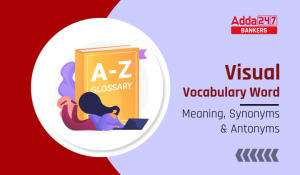1. STRIDE (noun) छलाँग
Meaning: A long step or stage in making progress.
Synonyms: clump, tramp, stomp, stalk.
Antonyms: amble, meander, ramble, wander.
Usage: In two bounding strides the woman was in the street, kneeling over her friend.
2. VEXATIOUS (adjective) कष्टकर
Meaning: Causing or tending to cause annoyance, frustration, or worry.
Synonyms: annoying, irksome, infuriating, exasperating.
Antonyms: pleasing, soothing, aiding, assisting.
Usage: This vexatious problem was resolved, incompletely, by civil war and secession.
3. STODGY (adjective) मैला-कुचैला
Meaning: Dull and uninspired; lacking originality or excitement.
Synonyms: uninteresting, uninspired, monotonous, humdrum.
Antonyms: exciting, entertaining, breathtaking, enthralling.
Usage: Most of my students used informal, asymmetrical balance, as formal balance can seem stodgy and dull.
4. DODDER (verb) डगमगाना
Meaning: tremble or totter, typically because of old age.
Synonyms: stumble, stagger, sway, lurch.
Antonyms: steady, fix, stay, still, remain.
Usage: The old woman doddered from the bed to the table.
5. AGAPE (adjective) भौंचक्का
Meaning: (of a person’s mouth) wide open in surprise or wonder.
Synonyms: agog, breathless, enthusiastic, raring.
Antonyms: apathetic, indifferent, unimpressed, uninterested.
Usage: When I first saw the sunset in the Grand Canyon, I could only stand staring with my mouth agape.
6. TORPOR (noun) उदासीनता
Meaning: a state of physical or mental inactivity; lethargy.
Synonyms: listlessness, languor, stagnation, idleness.
Antonyms: eagerness, keenness, spiritedness, vigor.
Usage: During the winter, the bears fall into an intense torpor.
7. PRECARIOUS (adjective): अनिश्चित
Meaning: dependent on chance; uncertain.
Synonyms: unsure, unpredictable, doubtful, dubious.
Antonyms: certain, stable, confirmed, definite.
Usage: As Finance Secretary I found that the finances of the state were in a precarious condition.
8. CONFABULATE (verb): बातचीत करना
Meaning: to talk informally.
Synonyms: chitchat, gossip, patter, schmooze.
Antonyms: be silent, be quiet, listen.
Usage: Guests gathered in the hallway to confabulate about the weather and make small talk.
9. EERIE (adjective): भयग्रस्त
Meaning: strange and frightening.
Synonyms: sinister, ghostly, creepy, haunting.
Antonyms: normal, ordinary, prosaic, routine.
Usage: An eerie feeling came over us as we watched the scary movie.
10. SUCCINCTLY (adverb): संक्षेप में
Meaning: in a way that expresses what needs to be said clearly and without unnecessary words.
Synonyms: brief, compendious, concise, terse.
Antonyms: circumlocutory, diffuse, long-winded, prolix.
You may also like to Read:




 Daily Vocabulary Words 03 & 04 Decem...
Daily Vocabulary Words 03 & 04 Decem...



